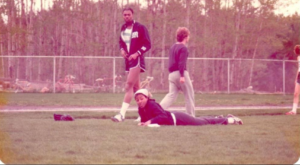
Taylor Treacy
Wrote this article for you. Click the icon to view her awesomeness.
“Whatever it takes to shorten the gap between yourself and the player who is currently beating you out, you should be doing it.”
If you’re a student-athlete who is tired of riding the bench, this article is for you.
As a freshman in college, I was in total denial about my ability to contribute to a Top 25 Division 1 volleyball program. I mistakenly believed that I’d just show up to practice and make an immediate impact on the court.
I never expected that two whole seasons would pass by before I was ready to play and score points in a game.
At one point, I felt so discouraged that I was ready to quit volleyball altogether.
Before I was able to throw in the towel, an old coach of mine intervened and gave me some life-changing advice. His message enabled me to transform from “the worst freshman in UNC volleyball program history” (Real words from my assistant coach.) to a 2x First-Team All-ACC athlete and an NCAA All-American.
I am going to share his advice with you, today.
Before we dig in, let’s acknowledge the challenges that lay ahead. Getting off the bench is hard work. There were many factors that contributed to my lack of playing time, but most of them had to do with my mentality. I believe that anyone can level up, but it requires a strong mind.
If you think you are ready to put in the work, keep reading.
Tip 1: Stop Complaining
Nothing is more annoying than an athlete who talks about being great and winning championships, only to show up to the weight room, practices, and games with a laundry list of complaints.
If you sound like this:
“Why do we have to work out so early in the morning?”
“Why do we have to do team-related activities on our off days?”
“Why is she playing over me?”
“Why can’t my coach see how awesome I am and put me in already?”
Blah. Blah. Blah.
You should think about this:
- No one is making you do this. You were the one who wanted to play a sport. If you feel like walking away, you are free to do so right now.
- Complaining to your teammates is toxic behavior. Negativity can devastate an entire season and if your coach thinks you are the source of it, you can kiss any hope of playing goodbye.
- You should be grateful for any opportunity to play a team sport because the experience is so rewarding. If you can’t think of three ways your sport has enriched your life, maybe you shouldn’t be playing at all.
And try doing this:
Here’s a simple trick to help you stay in the right mindset: Swap the “I have to do x, y, or z” statement for “I get to do x, y, and z”.
Say these two sentences in your head:
“Now, we have to go to weights.”
“Now we get to go to weights.”
Which variation sounds more positive to you? Swapping “I have to do this” for “I get to do this” worked wonders for me as a student-athlete. It made me look at the tasks ahead as things I had the privilege to do, rather than some unwanted challenge.
Try this for yourself and see if it works.
Tip 2: Show That You Care
If you want to get more playing time, your coaches and teammates need to know that you’re serious about making game day contributions.
There are many ways to demonstrate your commitment to the team’s success.
Ask for more reps.
At some point in the season, your coaches will start to plan practice around the needs of the core athletes who play in games.
This means that those who aren’t playing on game day will receive fewer opportunities to refine their skills in practice.
If you fall into this category, you should be asking your coaches and teammates for extra reps outside of scheduled practices.
Coaches get excited when athletes want to do more, so don’t hesitate to reach out for extra support. If you plan to ask a teammate, make sure it’s someone who can perform the specific skill you want to improve.
Connect with your coach.
If you are a high school or college student-athlete, swing by your coach’s office between classes.
These people have dedicated their lives to helping young athletes succeed and they chose to have YOU on their team.
They want to see you excel.
When you visit a coach, ask them about their lives, or tell them about your day. You don’t have to talk shop when you’re there, but over time, you’ll start to understand what motivates them to play one athlete over another.
Deepening this relationship will also help your coaches understand your motivators, which will incline them to invest more energy into building out your role on the team.
Connect with your teammates.
If you aren’t connecting with your teammates outside of practices and games, chances are you aren’t going to add much to the team’s chemistry.
Trust is the foundation of group sports, and one sour relationship with a teammate can determine whether you play or not. Coaches know that teams who “play for each other” have a better shot at succeeding.
Connecting with your teammates will help you focus less on yourself and more on lifting up others around you. This mindset will carry you through tough practices and drills on the days you feel like you can’t push any further.
Tip 3: Control The Controllable
Getting off of the bench requires patience. It takes time to arrive at a point where you are ready to play in games, and even longer to earn your coach’s trust.
Until then, there are things within your control that require immediate action.
Be a leader.
You can be a leader, whether you play on game day or not. Identifying your unique style of leadership will help you add value to your team’s environment.
Some athletes offer very eager and excitable demeanors to support their teammates. Others are great at delivering intensity and pushing the people around them. Some provide a very nurturing and loving leadership.
Everyone leads in their own way.
If you can’t identify with any of the previously listed styles of leadership, don’t worry. There are many ways to add value to your team’s environment while staying true to your natural personality. Pinpoint your natural gifts and use them to support your teammates.
Be accountable.
If you are fighting for playing time, you need to make sure that you have all of your ducks in a row.
- Show up to practice on time.
- Pack the right gear before games and practices.
- Keep your academics in check.
- Stay out of trouble.
Simply put, keep your sh*t together and don’t give your coaches or teammates a reason to not trust you.
Outwork everyone.
This one isn’t easy, but you’ve got to do it if you want to prove that you are ready to play.
- Ask for more reps.
- Talk to your coaches.
- Work on your relationships with your teammates.
- Go hard in the weight room.
- Go for the ball that everyone else gave up on in practice.
- Do extra conditioning so that you are faster, stronger, and more agile than everyone that’s playing ahead of you.
- Eat better.
- Drink less.
Whatever it takes to shorten the gap between yourself and the player who is currently beating you out, you should be doing it.
No excuses.



